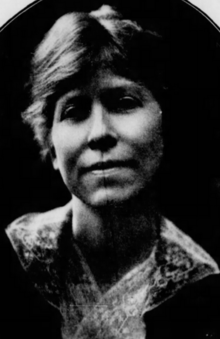A. Evelyn Newman
American educator
A. Evelyn Newman (1881-01-08 – 1969-11-27) was an American college professor, writer, and peace activist. She was Dean of Women and taught English at Colorado State Teachers College from 1923 to 1929, and taught at Simmons College in Florida. She was an American delegate to the International Congress of Women in The Hague in 1915, worked in France during World War I, and was elected chair of the National Association of Deans of Women in 1927. Much of her writing was about World War I, peace and international cooperation.

Quotes
edit- "Hundreds of babies are fed and washed and wrapped in warm, new baby flannels and placed back again into grateful mothers' arms. All day and all night they come, one constant stream from evacuated towns, with tales too pitiful to listen to, and yet always with courtesy and graciousness that almost shames."
- "Scenes from a Canteeneer's Life in France". France. 2 (1919): 27.
- Newman worked at a YMCA canteen in France during World War I, serving both refugees and military personnel.
- "Before this war it was difficult to see that fair play was done to the people. I believe hearts have been softened. There is a greater sense of community. The people have gone through a fiery furnace together."
- "The Silent Voices" Dearborn Independent (November 8, 1919): 5.
- "From the horror of dead and wounded that I saw in just my little corner of war work, my mind is constantly seeking to escape. Again I see the sad, appealing eyes of the terribly disfigured men in the face and jaw hospital in Paris. Again I hear the call: 'Clear the way for the blind!' and see our sightless boys slowly making their way down the gangplank to their homeward-bound ships at Brest. And the armless ones and legless ones! And the insane! How many thousands of such has this war made!"
- "The Silent Voices" Dearborn Independent (November 8, 1919): 5.
- "Our time will be remembered as one of reconciliation for the great European enemies during the World War. Statesmen of France, Germany, Poland, Czecho-Slovakia, Italy, and Great Britain realized that nations were interdependent and that what was disastrous to one would be disastrous to all."
- "Peace on Earth, Good Will to Men" Educational Review 72(December 1926): 263.